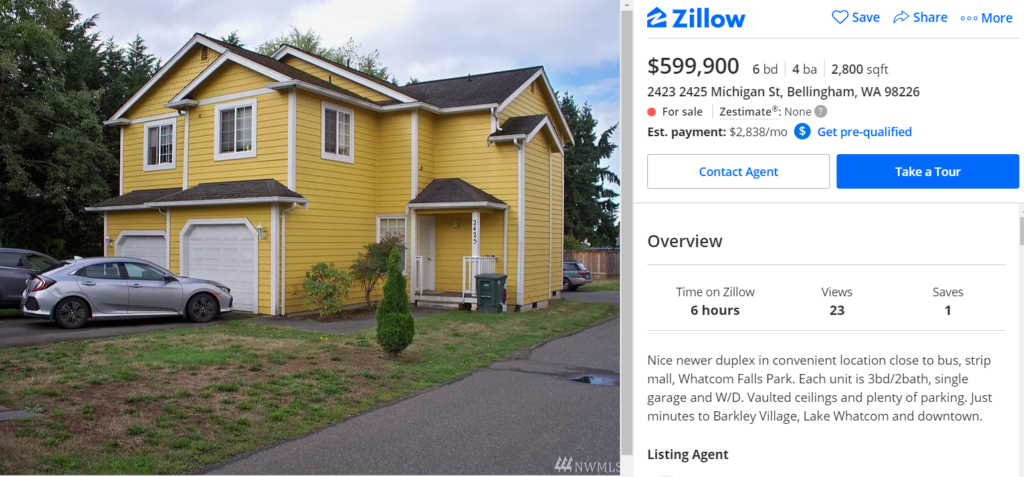Real estate investing is one of the greatest methods to building wealth. Roughly 90% of the worlds millionaires were made by investing in real estate. So why aren’t you?
Real estate investing is tier two of my fail safe retirement plan. The passive income from our rentals will help me and my wife retire early. This is a tried and true way to build wealth (if done correctly).
You may be interested in real estate investing, but your local market is holding you back. Prices could be too high in your area. Perhaps local rental rates don’t justify purchase prices, or maybe you’ve never thought about investing in real estate.
If you’re like me, and your local market doesn’t make sense for real estate investing, then you’ll need to consider looking elsewhere.
Does Your Local Market Make Sense for Real Estate Investing?
So, how do you know if your local market does or doesn’t make sense for real estate investing? A general rule of thumb is called the 1% rule. If you can find a piece of property that will rent for 1% of the overall purchase price of the property, then the property will most likely generate positive cash flow.
Let’s take a look at my local area, Bellingham, WA to see if how the 1% rule holds up.

This duplex just came on the market for $599,900. It has two 3 bed/2bath units. In order to meet the 1% rule, each unit would need to rent for $3,000 per month.
There are a few different ways to find out what comparable properties are renting for. You can use Zillow, Craigslist, or rentometer.com.
Talk about serendipity in this case, there’s actually a property for rent on the same street right now, listed on Zillow.

This unit is renting for $1,800 per month. So assuming we’d get the same in rent for the property listed above, that would be $3,600 total per month in rent. That doesn’t even come close to 1%. We’re looking at only 0.6%!
Like I said, the 1% rule is just a rule of thumb. If you want to do a full analysis on a property to see if it will cash flow, check out how to do it here.
After checking the 1% rule and doing a full property analysis, you may find that your area is not great for real estate investing. But fear not, there are other options!
Out of State Real Estate Investing
I am by no means an expert in this area, but I have multiple experiences renting out of state properties.
In 2016 and 2017, Janene and I were looking for our first rental property to purchase. We made a few offers, but because of the rising housing prices and competition in Bellingham, we got priced out of the area.
We were feeling pretty discouraged at the time. However, Janene’s dad, who is a realtor in Alaska told us about a duplex for sale. After running the numbers, the property looked like it was exactly what we were looking for so Janene flew up to Alaska to take a look.
One month later, we were the owners of our first (out of state) rental property.

Our second experience with an out of state rental happened In 2018. We moved to Portland, OR and rented out our house in Washington. So how do we make it work?
Finding a Location and Making an Offer
The first step for out of state real estate investing is finding an area that makes sense. You can look up mutli-family properties on Zillow to check the 1% rule or due a full cash flow analysis.
I recommend considering markets where you have friends or family. If you’re looking in a market where you have someone you know locally, you can form a partnership with that person. You’ll have to work out the terms of the partnership, but having someone local that you know managing the property is a huge plus.
From here on out, I’ll assume that you’re not able to work out a partnership with a friend or family member locally, but we can still make it work!
First thing first – finding a realtor. You can use Zillow to locate a realtor: once you find a property you like, just contact the selling agent. Mention that you don’t have a buyer’s agent representing you and that you’d let them be your buyer’s agent. This gives the agent extra incentive to work out a deal for you because they’ll get double the commission.
Once you find a property you’re wanting to make an offer on, have the real estate agent do a video walk through of property for you.
Based on the video walk through, if the property looks right, then make an offer! With technology in this day and age, physically viewing the property isn’t completely necessary. You can get a good feel for a property over video and talking with your real estate agent.
Always get an inspection before purchasing a property. And make sure your offer has an inspection contingency. That way if an inspection comes back finding major rot or structural damage you can easily back out of the deal.
Renovations from Afar
If you buy a property that needs some fixing up, don’t fret, you can do this long distance.
Based on the video walk through from your real estate agent, make notes of everything that looks like it needs updating. You can do a Google search to find general contractors in the area where you’re purchasing the property. Many contractors have online reviews and photos of their renovations. Have a few contractors walk the property and give you a quote.
Once you find a contractor you like, pull the trigger and have them start the renovations. Tell them you’d like photo updates of the work on a weekly basis, to make sure the renovations are going according to plan.
Managing the Property
A property management company will find tenants and collect rent. They’ll also deal with property maintenance for you (although you still get the bill).
You can easily find property management companies by doing a Google search. You can check online for reviews as well. Another great resource is BiggerPockets. You can post a question on the forums asking what property management companies are best in a certain area, and almost immediately get a response.
A property management company will typically charge 10% of the monthly rent. Make sure you know what their fees are and account for them when analyzing the cash flow of the property.
Seeing the Property In Person
How often you physically see the property is up to you. I’d argue that it’s even better to be an out of state real estate investor because it takes the emotions out of it.
Every time I drive by our rental properties I get anxiety because I see something different or out of place and think, “The grass is too long. Why is the garage door open? Who’s that person outside?!”
If you’re not close enough to drive by the property regularly, you will likely not stress as much about it.
Next Steps
So how do you get started? I’d start by looking at an area you think may be good for real estate investing. It’s ideal to form a partnership with someone local (a friend or family member), and have them manage the property. But if that’s not the case for you, you an can also invest in real estate 100% remotely.
Real estate investing is a great way to build wealth and establish passive income. It’s an amazing feeling when you have an asset that is reliably producing money for you with minimum effort. So stop reading this and start analyzing some properties!
